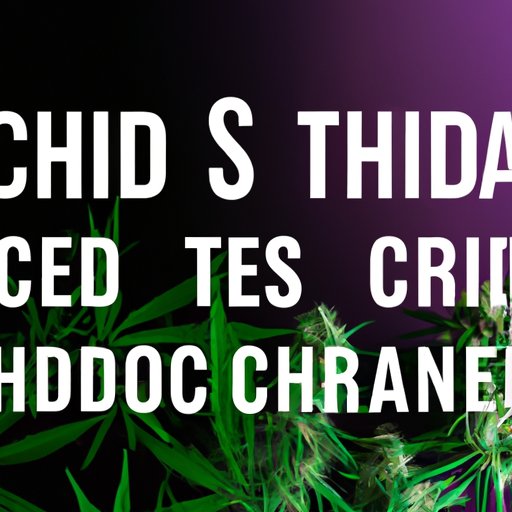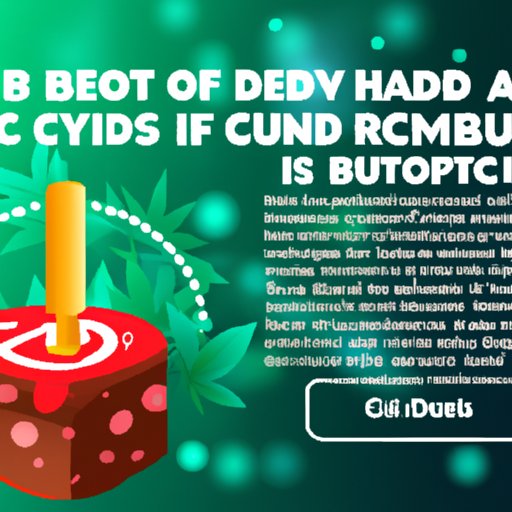Introduction
As cannabidiol (CBD) continues to grow in popularity, there has been much debate about whether or not it can get you high. This question is not surprising, as CBD is derived from the same plant as delta-9 tetrahydrocannabinol (THC), the psychoactive compound that produces a high. It is important to understand the differences between CBD and THC to better answer this question and clear up any confusion surrounding the topic.
Exploring the Science Behind CBD: Why It Doesn’t Get You High
Both CBD and THC interact with the body’s endocannabinoid system (ECS), which is responsible for regulating various bodily functions such as mood, appetite, and pain. However, these compounds affect the system in different ways. THC directly binds with the CB1 receptors in the ECS, which produces a high. On the other hand, CBD does not bind with CB1 receptors and instead indirectly interacts with them. This interaction does not produce a high.

CBD vs. THC: Understanding the Differences and Effects
THC is the psychoactive component of marijuana, while CBD is not. THC produces a euphoric high and can alter perception, while CBD does not. The effects of THC can include altered thinking, memory, and coordination, while the effects of CBD are more therapeutic, including reduction of pain, anxiety, and inflammation.

Clearing Up the Confusion: Debunking Marijuana Myths about CBD
One common misconception is that all marijuana products, including CBD, are illegal. However, this is not true. CBD derived from hemp that contains less than 0.3% THC is legal at the federal level. Another myth is that CBD and THC have the same effects on the body, but this is incorrect. While there may be some similarities, the compounds have different effects and interact with the ECS in different ways.
How CBD Works in the Body and Why You Won’t Get High
CBD is metabolized by the liver and broken down into compounds that can be eliminated from the body. This process does not produce any psychoactive effects. Additionally, CBD does not bind with CB1 receptors in the brain, which is responsible for producing a high.
The Benefits of CBD: Pain Relief, Anxiety Reduction, and More
CBD has been the subject of much research in recent years, and studies have shown that it has numerous benefits for a variety of medical conditions. These benefits include pain relief, anti-inflammatory effects, anxiety reduction, and seizure reduction. CBD has also shown promise in treating substance abuse and addiction.
Real People, Real Stories: How CBD Changed My Life Without the High
There are many personal anecdotes from people who have tried CBD and experienced its benefits. These stories include people who have found relief from pain, anxiety, and depression, as well as those who have found it helpful in recovering from addiction. One of the best things about CBD is that it doesn’t produce a high, making it an ideal option for those who want the benefits of marijuana without feeling intoxicated.
The Legal Side of CBD: What the Farm Bill Means for Users
In 2018, the US government passed the Farm Bill, which made hemp and products derived from it federally legal. This includes CBD derived from hemp that contains less than 0.3% THC. However, CBD derived from marijuana is still illegal at the federal level. It’s important to make sure you are purchasing CBD from a reputable source that has third-party lab testing to ensure that the product contains the advertised levels of CBD and does not contain THC over the legal limit.
Conclusion
CBD and THC are two compounds that interact with the body’s endocannabinoid system in different ways. THC produces a high, while CBD does not. CBD has numerous therapeutic benefits, and personal stories continue to emerge about how it has impacted people’s lives. The 2018 Farm Bill has made CBD derived from hemp federally legal, but it’s still important to purchase CBD from a reputable source to ensure its purity and legal status.
Understanding the differences between CBD and THC and the benefits and effects of each is essential in making informed choices about marijuana use. By debunking myths about CBD and exploring its effects on the body, we can better answer the question of whether or not you can get high off CBD.
